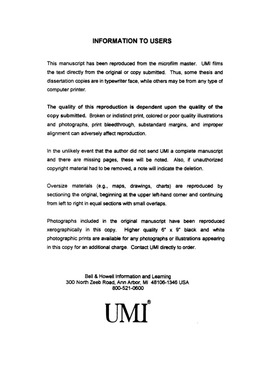| dc.contributor.advisor | Meo, Mark, | en_US |
| dc.contributor.author | Ziebro, Becky Marsh. | en_US |
| dc.date.accessioned | 2013-08-16T12:31:13Z | |
| dc.date.available | 2013-08-16T12:31:13Z | |
| dc.date.issued | 2000 | en_US |
| dc.identifier.uri | https://hdl.handle.net/11244/6068 | |
| dc.description.abstract | This research integrates theoretical constructs from the literature on social learning and policy innovation, together with site-specific information, in the creation of a decision-making schematic for environmental policy innovation by the city of Tulsa, Oklahoma. A qualitative inquiry was undertaken to interpret human actions taken during the development of three innovative policy measures. Case studies were developed and examined to determine the degree to which attributes of social learning and innovation identified in the literature were evidenced. A decision-making schematic for the innovation/social learning process in the city of Tulsa was developed. A survey of policy entrepreneurs who were engaged in the innovation process was subsequently conducted to determine the cumulative nature of social learning by the city. The overall goal of this study was to obtain a better understanding of the process of municipal-level environmental policy innovation as a first step toward a sustainable society. | en_US |
| dc.description.abstract | The manner in which man views environmental problems is undergoing a radical transformation. Awareness is increasing that past efforts at environmental protection are insufficient and that changes, often drastic, are necessary. Clearly, greater understanding of natural systems is needed. However, scientific knowledge alone is insufficient. Scientific information must be translated into viable policy options. "Sustainability" will require increased knowledge of both the natural and social environments. Particularly useful will be knowledge pertaining to how scientific information is utilized in the process of what has been termed "social learning". Social learning occurs when society undergoes a transformation in the way it views an environmental problem or its solution. It often results from perceived changes in the social environment or from crisis situations. The focus of social learning is on how a problem is defined, what its scope is, or the goals its solution are intended to meet. It is often evidenced by innovative policy measures, though not all policy innovations are a result of or result in social learning. | en_US |
| dc.format.extent | 2 v. (xiv, 363 leaves) : | en_US |
| dc.subject | Environmental Sciences. | en_US |
| dc.subject | Environmental policy Oklahoma Tulsa. | en_US |
| dc.subject | Political Science, Public Administration. | en_US |
| dc.subject | Sustainable development Oklahoma Tulsa. | en_US |
| dc.subject | Social learning. | en_US |
| dc.title | Social learning for sustainability: A local government approach. | en_US |
| dc.type | Thesis | en_US |
| dc.thesis.degree | Ph.D. | en_US |
| dc.thesis.degreeDiscipline | School of Civil Engineering and Environmental Science | en_US |
| dc.note | Adviser: Mark Meo. | en_US |
| dc.note | Source: Dissertation Abstracts International, Volume: 61-12, Section: B, page: 6377. | en_US |
| ou.identifier | (UMI)AAI9998882 | en_US |
| ou.group | College of Engineering::School of Civil Engineering and Environmental Science | |
